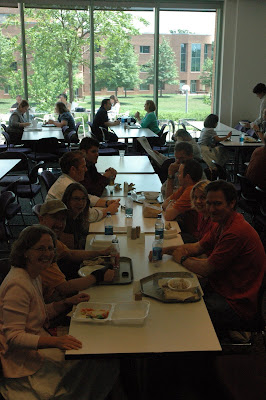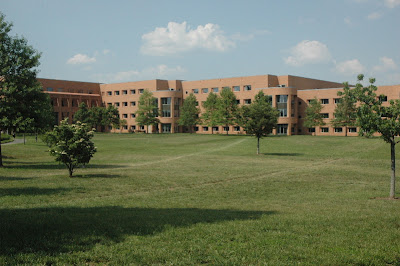
See, I really am in DC!!
The first thing you're required to do when you begin the process of joining the Foreign Service is to select your 'cone'. There are five career tracks and you have to pick yours prior to taking the written test which is the first step in the road. The different career tracks, known as 'cones', are Political, Economic, Consular, Public Diplomacy and Management. I chose Management.
Management folks are the people who take care of the running of our embassies so the other cones can go about their business and not worry about procuring supplies, running the motor pool, acquiring housing, managing the local staff, etc. In short, Management Officers provide a support function at our embassies and go through extensive training to ensure that they have the skills necessary to keep the infrastructure operating smoothly.
At each of our embassies, we hire most of our staff locally. These FSNs (Foreign Service Nationals) are supervised, primarily, by the Management branch and they become, over time, the experts in most of the admin jobs. While Management Officers rotate in and out every one, two or three years, the FSNs remain in place and possess the institutional memory that is so essential in running any organization. So, wherever you go as a GSO or Management Officer, you have a cadre of local hires reporting to you who know the job and the routines much better than you do. That doesn't present an insurmountable problem because your job is to manage and supervise, not to get down and turn the wrenches.
The GSO's areas of responsibility include housing, supplies, purchasing, motorpool, warehousing, maintenance, human resources, and travel. A lot of work to be sure, with a wide range of required skills. Islamabad has a staff of GSOs and I'm still trying to find out which responsibilities they have in mind for me. I'm looking forward to being part of the team there even if it is still five months away. It will be nice to get back to work again.
From the sound of it, we Management Officers seem to have pretty interesting jobs. We get a variety of work, we are essential to the smooth operation of our embassies, we work hand in hand with host country nationals who have the expertise to make us look good and we generally bask in the warm glow of goodwill emanating from our colleagues in the other cones. Or, perhaps not...
I've spent the last week learning all about handling 'housing' complaints. From the sound of it, our diplomats abroad do nothing but complain about their housing and all of those complaints are directed at the poor GSO. I've come to the conclusion that it must be mandatory for everyone to complain about their housing as soon as they arrive at post. "Look here, John, you've been at post for nearly a week now and you haven't lodged your housing complaints. Are you having personal problems at home that might prevent you from whining? If not, get to it, Man, we have high standards of griping here in Kafiristan and we can't have you lowering the bar." From the way it's been presented to us, pretty much all we do is deal with complaints about housing that is a) too small b) too far away c) too close in or d) not as nice as... (fill in someone else's name here; who, by the way, is also complaining about his/her house). It's nice to see that no one ever complains about the housing being too expensive and that, of course, is because it is all provided to them for FREE. There are many other things that people complain about when living abroad, but housing seems to top the list. Of course, no diplomat in his/her right mind would ever bring a housing appeal forward based on the "their house is nicer than mine" argument, so they have security issues, or insoluble pest infestations, or 'official' duties that require larger quarters than their entitlement. Management Officers get management training, Consular Officers get consular training and I believe the diplomats (Econs, Politicos and Pub Dips) get a course on how to assess their status at post based on their housing.
This will surprise those of you who know me, but my plan is to try to make people happy with their housing in Islamabad if I end up with the housing responsibility. Just as long as my house is the nicest on the block and better than everyone else's under the rank of Ambassador, I'll work day and night to ensure that almost everyone has very little to complain about. Of course, some complaining will always be inevitable but people will come to see that malcontents end up in houses that barnyard animals refuse to enter.
Actually, there are very strict rules and regulations governing the assignment of housing to try to make it as equitable as possible given the variety of housing that exists at our posts worldwide. In Islamabad, for example, the housing reputation is terrific and the houses are, apparently, very nice.
I'm going camping and tubing this weekend on a river in Virginia. It'll be nice to get out of the DC area for a short break so I've signed up for this trip with about fifteen of my colleagues. The last time I went off into the wilds, I ended up climbing a mountain in Bulgaria! I'm hoping to float around in my tube with a beer in one hand and cigar in the other while telling rude jokes to my compadres. I'm leaving the Urdu books home and intend to do nothing more strenuous than walk all the way down to the river with my tube on my shoulder. There is talk of a hike on Sunday, but I'll need much more specific information on the definition of 'hike' before I strap on my boots. Some of my colleagues seem fit enough to stroll over to Kentucky and foolish enough to try!

This is the 133rd's Team Lunch Table in the cafeteria.

Would you let this man assign your housing? I intend to begin whining about my own house in the taxi on the way in from the airport!













